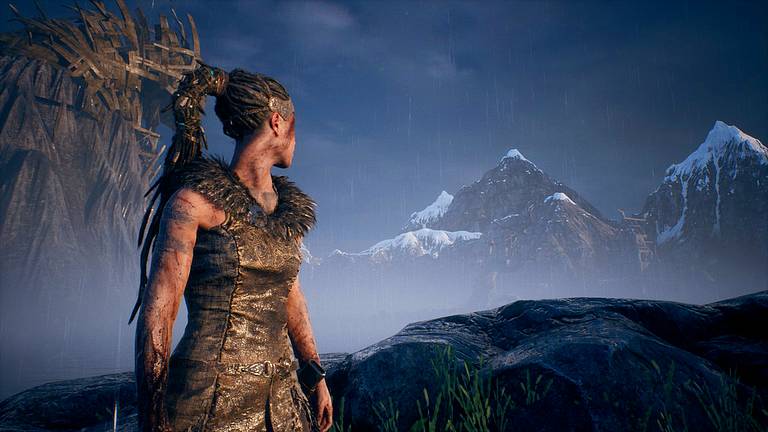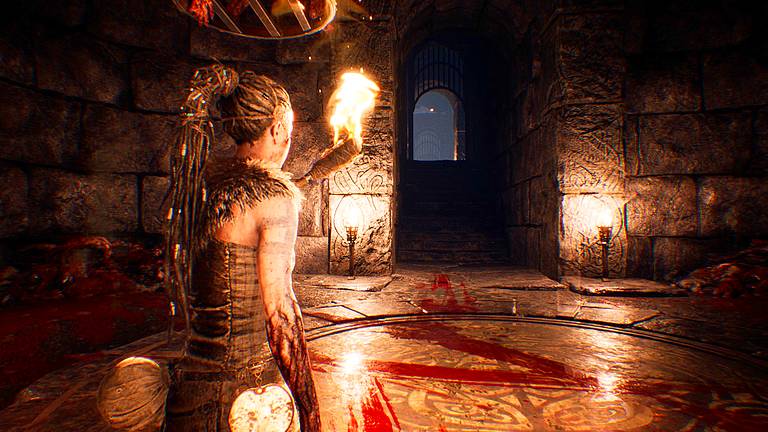Hellblade: Senua’s Sacrifice
Hellblade: Senua’s Sacrifice has been on my radar for quite some time now, as I’ve heard nothing but good things about it, but I only just picked it up in a sale at the end of last year. After finishing up with Death Stranding, I had narrowed down my choice for the first game of the new year to trying out Hellblade or going back to Horizon Zero Dawn. I picked Hellblade, and I’m glad I did.

Playing this game was a bit of a journey for me. I loved the setting and the mood and the story right away, but I had serious problems with the gameplay early on. I found a lot of mechanics extremely mysterious and downright irritating. The game never instructs you how to play, and I died many times because of it. It’s particularly frustrating because the one thing the game does tell you is that if you die too many times, the game will end and you’ll have to start over. (Yeah, I know about the secret thing now but I didn’t know it then.)
In retrospect, after finishing the game, I understand the reasoning behind the developers' choices. It makes the player sympathize more with Senua’s struggles. But I feel like if they had done a little bit more to convey that reasoning at the beginning, it would have generated more goodwill with me and saved me a lot of saltiness in the early going. I simply took the game at face value, and had no idea that there was a deeper meaning at play until the game was over. During my first boss fight, I was so annoyed that I quipped it was a “frustration simulator game.”
Looking back, in some ways, it actually is a frustration simulator game. It’s a game about Senua’s view of the world, and her struggles, and once the player is aware of that, it’s actually a fairly brilliant design. But the game never tells you that’s what it’s about. Not in so many words. I suppose it would be possible to puzzle it out, but you’d have to do it from a narrative that isn’t very linear and isn’t very logical on the surface.

This is the second game in a row I’ve played where the story requires a lot of thought and processing to really “get” it (after Death Stranding). It’s a very challenging story, and I love that about it. Even more so because I wasn’t aware of how challenging it was until it was over: I then watched the short developer “behind-the-scenes” feature (included with the game) and the entire nature of the story changed from “that was great but I don’t really get it” to “holy crap that was amazing on so many levels.”
Normally I get pretty irritated when a story requires external information to understand it properly, but in this case it was interesting enough that I gave them a pass on it. The story works well enough with or without the external information.
The point is, it’s a pretty short game, but it resonates for quite a while after finishing it. It deserved to win awards in 2017.
Now after two “serious” games in a row, I’m a bit burned out, so I’ve gone back to plugging away at The Witcher 2. I’m in Chapter 2. [Then I gave up on that and played some EverQuest II.]
P. S. This is one of those posts that’s just been sitting in my Drafts folder for a couple of weeks waiting for me to put in the effort to find some screenshots.
This page is a static archival copy of what was originally a WordPress post. It was generated from Markdown files with Hugo, a static web site generator. There may be formatting problems that I haven't addressed yet. There may be problems with missing or mangled images that I haven't fixed yet. There may have been comments on the original post, which I have archived, but I haven't quite worked out how to add them to the new site.
Note: Comments are disabled on older posts.